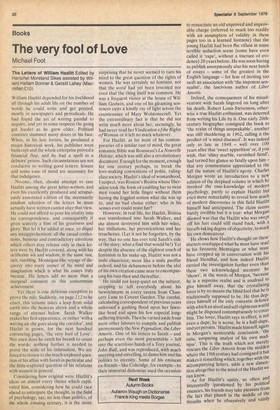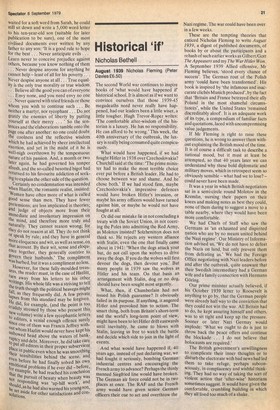Books
The very fool of Love
Michael Foot
The Letters of William Hazlitt Edited by Herschel Moreland Sikes assisted by Willard Hallam Bonner & Gerald Lahey (Macmillan El 0) William Hazlitt depended for his livelihood all through his adult life on the number of words he could write and get printed, mostly in newspapers and periodicals. He had found the art of writing painful to acquire, and yet in some respects the going got harder as he grew older. Political enmities slammed many doors in his face. When, in his late forties, he produced a major historical work, his publisher went bankrupt and the whole enterprise proved a financial flop, and he had a spell in a debtors' prison. Such circumstances are not conducive to writing good letters: leisure and some ease of mind are necessary for that indulgence.
No-one, then, should attempt to rate Hazlitt among the great letter-writers, and even his excellently produced and scrupulously annotated edition of the necessarily random selection of the letters he must actually have written cannot alter that view. He could not afford to pour his vitality into his correspondence, and consequently it gives scarcely a hint of his greatness and glory. But let it be added at once, to dispel any misapprehension: all the casual confessions, humour and contradictory emotions which others may release only in their letters were by fhtzlitt covered, along with his deliberate wit and wisdom, in the same vast, rich, rambling, Montaigne-like voyage of discovery into every corner of his mind and imagination which is what his essays truly became. His letters add no more than a marginal comment to this consummate achievement.
Yet there is one delirious exception to prove the rule. Suddenly, on page 212 to be exact, this volume takes a leap from solid earth into the heavens above and a whole range of abysses below. Sarah Walker makes her first appearance, or rather 'with a waving air she goes along the corridor', and Hazlitt is grown, for the next hundred entrancing pages, 'the very fool of Love'.
Not once does he catch his breath to count the words: nothing further is needed to prove the scale of his infatuation. We are forced to return to the much-explored question of his affair with Sarah in particular and the little-explored question of his relations with women in general.
Considering how original were Hazlitt's ideas on almost every theme which capti
vated him, considering how he could race ahead to anticipate the thought, in the field of psychology, say, no less than politics, of the whole ensuing century, it is the more
surprising that he never seemed to turn his mind to the great question of the rights of women. He was certainly no feminist, not that the word had yet been invented nor even that the thing itself was common. He was a frequent visitor at the house of William Godwin, and one of his gleaming sentences casts a kindly ray of light across the countenance of Mary Wolstonecraft. Yet the extraordinary fact is that he did not write much more about her; seemingly, he had never read her Vindication of the Rights of Woman or it left no mark whatever.
For Hazlitt, as for most of his contemporaries of a similar cast of mind, the great romantic Bible was Rousseau's La Nouvelle Heloise, which was still also a revolutionary document. Enough for the moment, enough for one century perhaps, to break the love-making conventions of polite, rulingclass society. Hazlitt's ideal of womanhood, I suspect, was Rossini's Rosina whose liberation took the form of enabling her to twist men round her little finger without them having the foggiest notion what she was up to, and no had choice either: who in his senses ever could resist her?
However, in real life, for Hazlitt, Rosina was transformed into Sarah Walker, and she almost destroyed him with her wiles, her titillations, her prevarications and her treacheries. (Let it not be forgotten, by the way, that no one has ever told Sarah's side of the story: what a find that would be!) Yet despite the absence of the slightest touch of feminism in his make-up, Hazlitt was not a male chauvinist; more like a male pacifist indeed, and his debasement before the idol of his own creation came near to encompassing his ruin then and thereafter.
He could not keep quiet on the subject, stopping to tell everybody about his bewitchment in every tavern from Chancery Lane to Covent Garden. The careful, calculating correspondent of previous years unloosed-a gushing flood upon her fawnlike head and upon his few especial long
suffering friends. Then he turned aside from most other labours to compile and publish
anonymously the New Pygmalion, the Liber Amoris. One of his letters to Sarah — and perhaps even the most presentable — fell into the scurrilous hands of a Tory journal, John Bull, and was reproduced, with much sneering and snivelling, to damn him and his politics to eternity. Some of his eminent ex-friends — like Coleridge, for example — to their immortal dishonour used the occasion to resuscitate an old unproved and unprovable charge (referred to much too readily with an assumption of validity in these pages too in a learned footnote) that the young Hazlitt had been the villain in some terrible seduction scene (some have even called it 'rape', without a tincture of evidence) 20 years before. He was soon having to publish anonymously also his next batch of essays — some of the greatest in the English language — for fear of inviting too swift an association with 'the impotent sensualist', the lascivious author of Liber Amoris.
Indeed, the consequences of his misadventure with Sarah lingered on long after his death. Robert Louis Stevenson, otherwise a true Hazlitt enthusiast, was deterred from writing his Life by it. One early 20thcentury biographer consigned the book to 'the realm of things unspeakable', another was still shuddering in 1962, calling it the product of 'a mind diseased'. It was indeed only as late as 1948 — well over 100 years after that 'sweet apparition' or, if you wish, that 'slimy marble, varnished fiend', had turned her glance so fatally upon him — that any commentator appreciated to the full the nature of Hazlitt's agony. Charles Morgan wrote an introduction to a new edition of the despised volume in which he invoked the case-knowledge of modern psychology, partly to explain Hazlitt but even more remarkably to reveal how much of modern discoveries in this field Hazlitt himself had anticipated. The claim seems barely credible but it is true: what Morgan showed was that the Hazlitt who was swept off his feet could still stand back, with a breath-taking degree of objectivity, to mark his own demeanour.
He shows how Hazlitt's thought on these matters overlapped what he must have read in his favourite Montaigne or what must have cropped up in conversation with his friend Stendhal, and how indeed Hazlitt carried the investigation further even than these two acknowledged mentors: he 'shows', in the words of Morgan, 'because he is a supreme realist and is unafraid to give himself away, that the crystallising lover is by no means the blind fool that he is traditionally supposed to be. He thus deprives himself of the only romantic defence with which an aloof and self-righteous world might be disposed contemptuously to cover him. The lover, Hazlitt says in effect, is not even a dupe; he is worse, he is a half-dupe, and yet persists.' Hazlitt made himself, again in Morgan's memorable conclusion, 'the sane, unsparing analyst of his own madness'. This is the truth which not merely rescues the Liber Amoris from the midden where the 19th century had consigned it but makes it something which, together with the accom panying letters, adds a new dimension altogether to the mind of the Hazlitt we canAksnofowr.
Hazlitt's sanity, so often and interestedly questioned by his political enemies, his friends may take pleasure from the fact that plumb in the middle of the months when he obsessively and vainly waited for a soft word from Sarah, he could still sit down and write a 5,000 word letter to his ten-year-old son (suitable for later Publication to be sure), one of the most civilised documents ever written by any father to any son: 'It is a good rule to hope for the best . . . Never anticipate evils . . . Learn never to conceive prejudice against others, because you know nothing of them • . . Never despise anyone for anything he cannot help — least of all for his poverty . . . Never despise anyone at all . . . True equality is the only true morality or true wisdom • . . Believe all the good you can of everyone • . . Envy none, and you need envy no one • . . Never quarrel with tried friends or those Whom you wish to continue such . . . Be neither a martyr, nor sycophant. . . Do not gratify the enemies of liberty by putting yourself at their mercy . . . ' So the sentences and theelaborations tumble onto the Page one after another: no one could doubt the coolness and the reflective wisdom Which he had achieved by sheer intellectual exertion, and yet in the midst of it he is well-nigh overthrown by the tempestuous nature of his passion. And, a month or two later again, he had governed his temper afresh, and the so-called besotted bigot had returned to his favourite addiction of seeking to explain the other side of the question. Certainly no condemnation was intended When Hazlitt, the romantic realist, insisted: 'Women have often more of what is called good sense than men. They have fewer Pretensions; are less implicated in theories; and judge of objects more from their immediate and involuntary impression on the mind, and therefore more truly and naturally. They cannot reason wrong; for they do not reason at all. They do not think OF speak by rule; and they have in general more eloquence and wit, as well as sense, on that account. By their wit, sense and eloquence together, they generally contrive to govern their husbands.' The compliment was barbed, but it was a compliment no less. However, for these fully-moulded treasnres, the reader must, in the case of Hazlitt, turn away from his letters to his other Writings. His whole life was a striving to tell ,trie truth though the political heavens might ;an, as they frequently did. A few private ',..aPses from this standard may be forgiven. e did, for example, (and the point is too crudely stressed by those who present this 1.1ew volume) write a few sycophantic letters 1..? editors, a venial enough offence surely !ince one of them was Francis Jeffrey withn_ ut whom Hazlitt would never have kept his unbowed head above the waters of bankr._aPtey and debt. Moreover, he did take care 1°. Pat all editors in their proper subservient P.lace in public even when he was smoothing tenveir sensibilities behind the scene, and e en before he had finally solved his own fornrcitional problems if he ever did — before, exarn—Pte, that the he had reached his conclusion e pursuit of beauty when beauty was s"LuL responding was `up-hill work', and u'uld, as he had also warned his young son, LPe set ' • aside for other satisfactions a 3°Iations, nd con



































 Previous page
Previous page